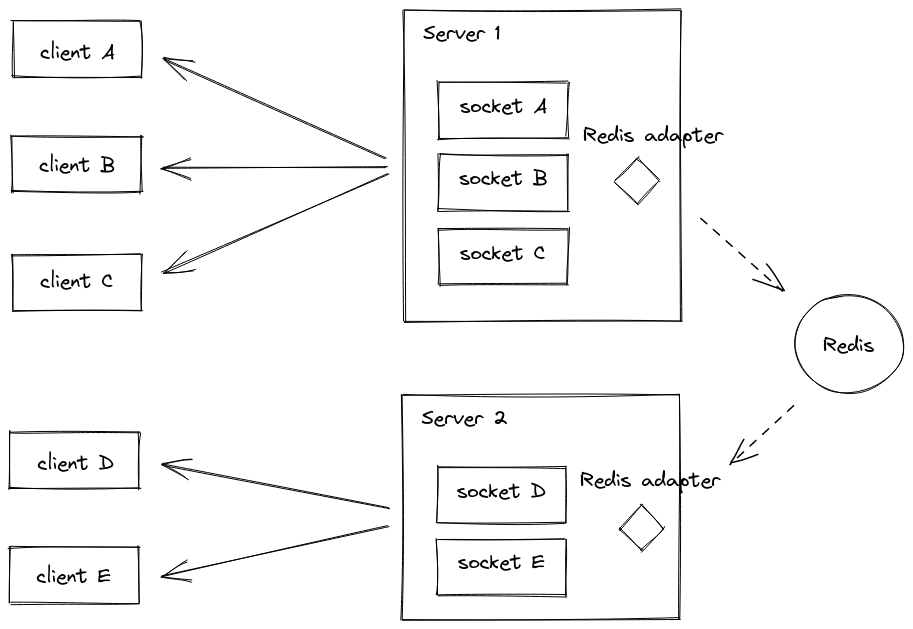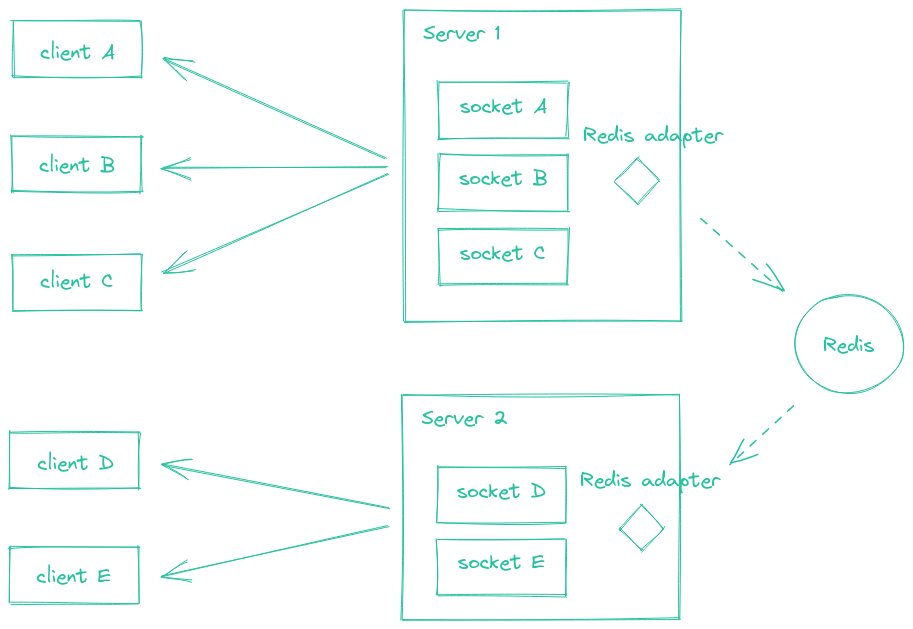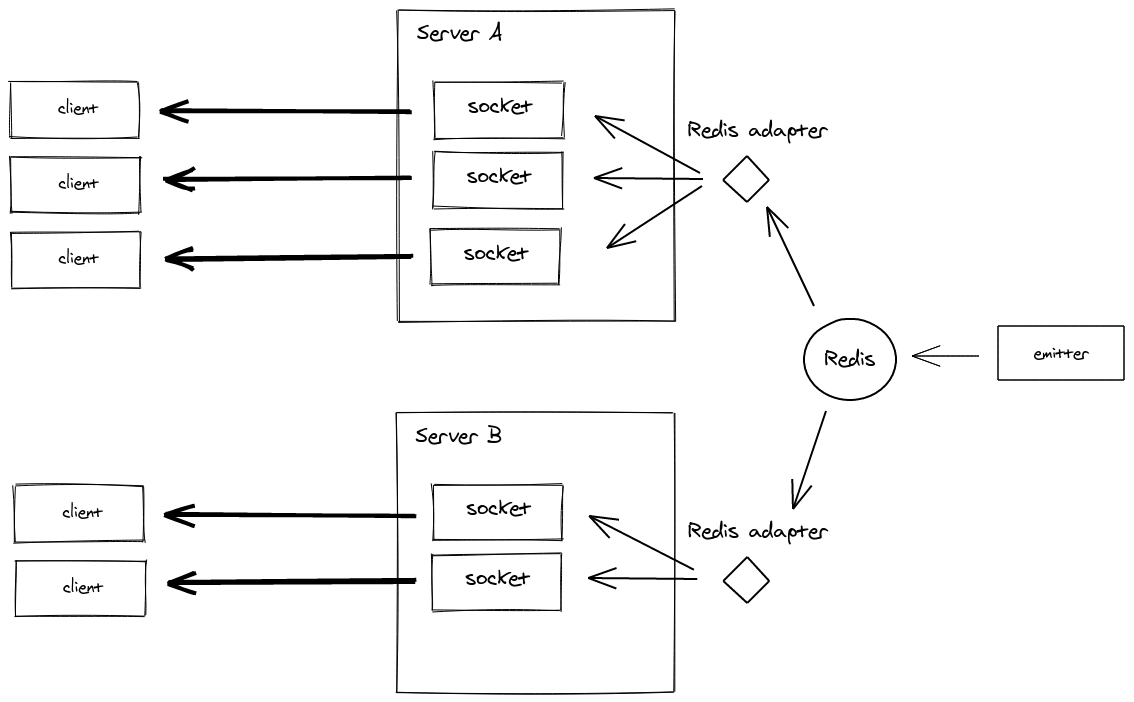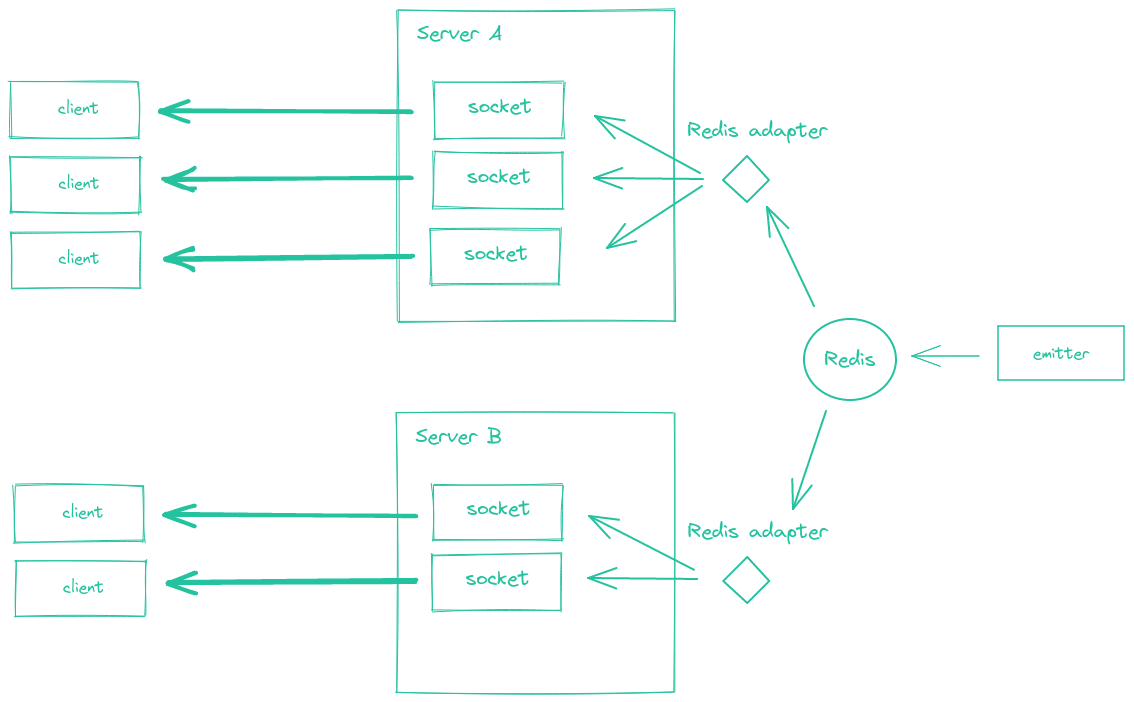Redis adapter
How it works
The Redis adapter relies on the Redis Pub/Sub mechanism.
Every packet that is sent to multiple clients (e.g. io.to("room1").emit() or socket.broadcast.emit()) is:
- sent to all matching clients connected to the current server
- published in a Redis channel, and received by the other Socket.IO servers of the cluster


The source code of this adapter can be found here.
Supported features
| Feature | socket.io version | Support |
|---|---|---|
| Socket management | 4.0.0 | ✅ YES (since version 6.1.0) |
| Inter-server communication | 4.1.0 | ✅ YES (since version 7.0.0) |
| Broadcast with acknowledgements | 4.5.0 | ✅ YES (since version 7.2.0) |
| Connection state recovery | 4.6.0 | ❌ NO |
Installation
npm install @socket.io/redis-adapter
Compatibility table
| Redis Adapter version | Socket.IO server version |
|---|---|
| 4.x | 1.x |
| 5.x | 2.x |
| 6.0.x | 3.x |
| 6.1.x | 4.x |
| 7.x and above | 4.3.1 and above |
Usage
For new developments, we recommend using the sharded adapter, which takes advantage of the sharded Pub/Sub feature introduced in Redis 7.0.
With the redis package
The redis package seems to have problems restoring the Redis subscriptions after reconnection:
You may want to use the ioredis package instead.
import { createClient } from "redis";
import { Server } from "socket.io";
import { createAdapter } from "@socket.io/redis-adapter";
const pubClient = createClient({ url: "redis://localhost:6379" });
const subClient = pubClient.duplicate();
await Promise.all([
pubClient.connect(),
subClient.connect()
]);
const io = new Server({
adapter: createAdapter(pubClient, subClient)
});
io.listen(3000);
With the redis package and a Redis cluster
import { createCluster } from "redis";
import { Server } from "socket.io";
import { createAdapter } from "@socket.io/redis-adapter";
const pubClient = createCluster({
rootNodes: [
{
url: "redis://localhost:7000",
},
{
url: "redis://localhost:7001",
},
{
url: "redis://localhost:7002",
},
],
});
const subClient = pubClient.duplicate();
await Promise.all([
pubClient.connect(),
subClient.connect()
]);
const io = new Server({
adapter: createAdapter(pubClient, subClient)
});
io.listen(3000);
With the ioredis package
import { Redis } from "ioredis";
import { Server } from "socket.io";
import { createAdapter } from "@socket.io/redis-adapter";
const pubClient = new Redis();
const subClient = pubClient.duplicate();
const io = new Server({
adapter: createAdapter(pubClient, subClient)
});
io.listen(3000);
With the ioredis package and a Redis cluster
import { Cluster } from "ioredis";
import { Server } from "socket.io";
import { createAdapter } from "@socket.io/redis-adapter";
const pubClient = new Cluster([
{
host: "localhost",
port: 7000,
},
{
host: "localhost",
port: 7001,
},
{
host: "localhost",
port: 7002,
},
]);
const subClient = pubClient.duplicate();
const io = new Server({
adapter: createAdapter(pubClient, subClient)
});
io.listen(3000);
With Redis sharded Pub/Sub
Sharded Pub/Sub was introduced in Redis 7.0 in order to help scaling the usage of Pub/Sub in cluster mode.
Reference: https://redis.io/docs/interact/pubsub/#sharded-pubsub
A dedicated adapter can be created with the createShardedAdapter() method:
With redis
Minimum requirements:
- Redis 7.0
redis@4.6.0
import { Server } from "socket.io";
import { createClient } from "redis";
import { createShardedAdapter } from "@socket.io/redis-adapter";
const pubClient = createClient({ host: "localhost", port: 6379 });
const subClient = pubClient.duplicate();
await Promise.all([
pubClient.connect(),
subClient.connect()
]);
const io = new Server({
adapter: createShardedAdapter(pubClient, subClient)
});
io.listen(3000);
With ioredis
Minimum requirements:
- Redis 7.0
ioredis@5.9.0
Please note that the shardedSubscribers option is required to enable sharded Pub/Sub.
import { Cluster } from "ioredis";
import { Server } from "socket.io";
import { createShardedAdapter } from "@socket.io/redis-adapter";
const pubClient = new Cluster(
[
{
host: "localhost",
port: 7000,
},
{
host: "localhost",
port: 7001,
},
{
host: "localhost",
port: 7002,
},
],
{
shardedSubscribers: true,
}
);
const subClient = pubClient.duplicate();
const io = new Server({
adapter: createShardedAdapter(pubClient, subClient)
});
io.listen(3000);
Options
Default adapter
| Name | Description | Default value |
|---|---|---|
key | The prefix for the Redis Pub/Sub channels. | socket.io |
requestsTimeout | After this timeout the adapter will stop waiting from responses to request. | 5_000 |
publishOnSpecificResponseChannel | Whether to publish a response to the channel specific to the requesting node. | false |
parser | The parser to use for encoding and decoding messages sent to Redis. | - |
Setting the publishOnSpecificResponseChannel option to true is more efficient since the responses (for example when calling fetchSockets() or serverSideEmit()) are only sent to the requesting server, and not to all the servers.
However, it currently defaults to false for backward-compatibility.
Sharded adapter
| Name | Description | Default value |
|---|---|---|
channelPrefix | The prefix for the Redis Pub/Sub channels. | socket.io |
subscriptionMode | The subscription mode impacts the number of Redis Pub/Sub channels used by the adapter. | dynamic |
Available values for the subscriptionMode option:
| Value | # of Pub/Sub channels | Description |
|---|---|---|
static | 2 per namespace | Useful when used with dynamic namespaces. |
dynamic (default) | (2 + 1 per public room) per namespace | Useful when some rooms have a low number of clients (so only a few Socket.IO servers are notified). |
dynamic-private | (2 + 1 per room) per namespace | Like dynamic but creates separate channels for private rooms as well. Useful when there is lots of 1:1 communication via socket.emit() calls. |
Common questions
Is there any data stored in Redis?
No, the Redis adapter uses the Pub/Sub mechanism to forward the packets between the Socket.IO servers, so there are no keys stored in Redis.
Do I still need to enable sticky sessions when using the Redis adapter?
Yes. Failing to do so will result in HTTP 400 responses (you are reaching a server that is not aware of the Socket.IO session).
More information can be found here.
What happens when the Redis server is down?
In case the connection to the Redis server is severed, the packets will only be sent to the clients that are connected to the current server.
Migrating from socket.io-redis
The package was renamed from socket.io-redis to @socket.io/redis-adapter in v7, in order to match the name of the Redis emitter (@socket.io/redis-emitter).
To migrate to the new package, you'll need to make sure to provide your own Redis clients, as the package will no longer create Redis clients on behalf of the user.
Before:
const redisAdapter = require("socket.io-redis");
io.adapter(redisAdapter({ host: "localhost", port: 6379 }));
After:
const { createClient } = require("redis");
const { createAdapter } = require("@socket.io/redis-adapter");
const pubClient = createClient({ url: "redis://localhost:6379" });
const subClient = pubClient.duplicate();
io.adapter(createAdapter(pubClient, subClient));
The communication protocol between the Socket.IO servers has not been updated, so you can have some servers with socket.io-redis and some others with @socket.io/redis-adapter at the same time.
Latest releases
| Version | Release date | Release notes | Diff |
|---|---|---|---|
8.3.0 | March 2024 | link | 8.2.1...8.3.0 |
8.2.1 | May 2023 | link | 8.2.0...8.2.1 |
8.2.0 | May 2023 | link | 8.1.0...8.2.0 |
8.1.0 | February 2023 | link | 8.0.0...8.1.0 |
8.0.0 | December 2022 | link | 7.2.0...8.0.0 |
7.2.0 | May 2022 | link | 7.1.0...7.2.0 |
Emitter
The Redis emitter allows sending packets to the connected clients from another Node.js process:


This emitter is also available in several languages:
- Javascript: https://github.com/socketio/socket.io-redis-emitter
- Java: https://github.com/sunsus/socket.io-java-emitter
- Python: https://pypi.org/project/socket.io-emitter/
- PHP: https://github.com/rase-/socket.io-php-emitter
- Golang: https://github.com/yosuke-furukawa/socket.io-go-emitter
- Perl: https://metacpan.org/pod/SocketIO::Emitter
- Rust: https://github.com/epli2/socketio-rust-emitter
Installation
npm install @socket.io/redis-emitter redis
Usage
import { Emitter } from "@socket.io/redis-emitter";
import { createClient } from "redis";
const redisClient = createClient({ url: "redis://localhost:6379" });
redisClient.connect().then(() => {
const emitter = new Emitter(redisClient);
setInterval(() => {
emitter.emit("time", new Date);
}, 5000);
});
Note: with redis@3, calling connect() on the Redis client is not needed:
import { Emitter } from "@socket.io/redis-emitter";
import { createClient } from "redis";
const redisClient = createClient({ url: "redis://localhost:6379" });
const emitter = new Emitter(redisClient);
setInterval(() => {
emitter.emit("time", new Date);
}, 5000);
Please refer to the cheatsheet here.
Migrating from socket.io-emitter
The package was renamed from socket.io-emitter to @socket.io/redis-emitter in v4, in order to better reflect the relationship with Redis.
To migrate to the new package, you'll need to make sure to provide your own Redis clients, as the package will no longer create Redis clients on behalf of the user.
Before:
const io = require("socket.io-emitter")({ host: "127.0.0.1", port: 6379 });
After:
const { Emitter } = require("@socket.io/redis-emitter");
const { createClient } = require("redis");
const redisClient = createClient();
const io = new Emitter(redisClient);
Latest releases
| Version | Release date | Release notes | Diff |
|---|---|---|---|
5.1.0 | January 2023 | link | 5.0.0...5.1.0 |
5.0.0 | September 2022 | link | 4.1.1...5.0.0 |
4.1.1 | January 2022 | link | 4.1.0...4.1.1 |
4.1.0 | May 2021 | link | 4.0.0...4.1.0 |
4.0.0 | March 2021 | link | 3.2.0...4.0.0 |